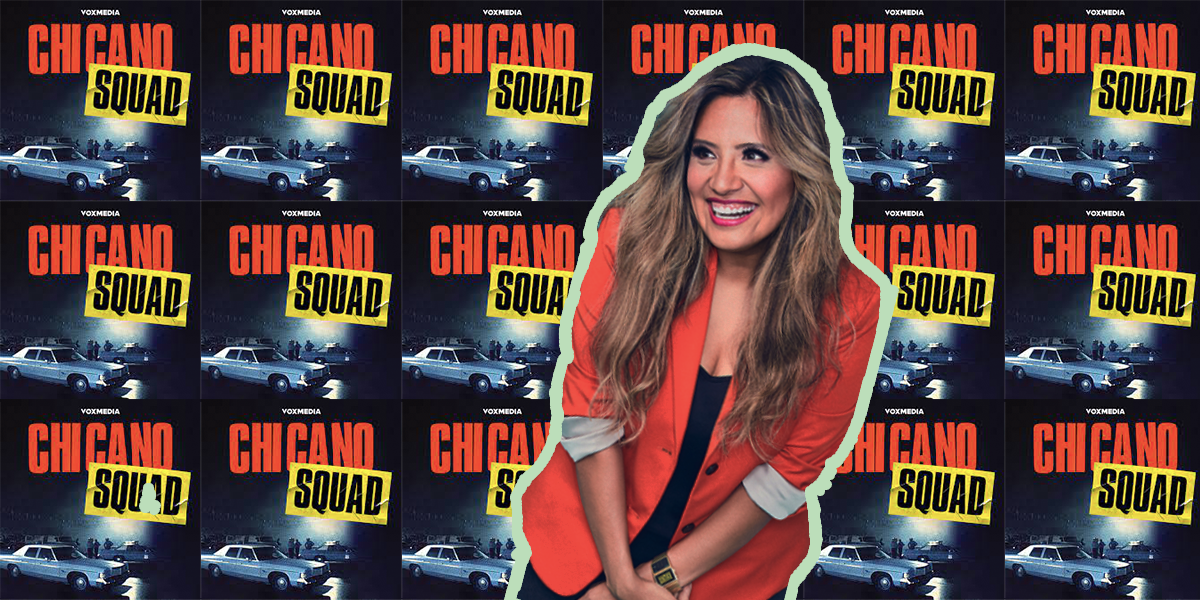In the podcast, Chicano Squad, Cristela Alonzo narrates the incredible true story of the first all-Latino homicide squad in the United States. The series has 11 episodes and sheds light on a piece of Latino history you’ve likely never heard before.
Before I even listened to the podcast, I was thrilled to learn that history-making writer, comedian, and activist, Cristela Alonzo was the host. In 2014, she made history as the first Latina to create, write, and star in a network sitcom, Cristela. And in 2017, she was the first Latina to star and lead in a Pixar movie, Cars 3. This Tejana brings an incredibly unique and intimate perspective to the story.
The first episode dives straight into the death of José Campos Torres, a 23-year-old Mexican-American veteran, in Houston, Texas. On May 7, 1977, the police arrested Torres, brutally beat him, and two days later a boat operator discovered his body in the waters of Buffalo Bayou. Although the story begins in the 1970s, the scene is almost identical to today’s news regarding police brutality. The death of the Latino veteran rocked the community who organized and demanded justice. Their movement led to the creation of the Chicano Squad.
One thing I appreciate is how the series is less about police glorification and more about a group of scrappy, imperfect officers solving homicides.
The Chicano Squad started off as a group of “special assignment officers” with 90 days to solve the cold case homicides that no one else could crack – in part, because of the language barrier, but mostly due to apathy. The Chicano Squad quickly realized that when a Latino was killed, not much investigating was done. The five patrol officers, Cecil Mosqueda, Robert (Bobby) Gatewood, U.P. Hernandez, Raymond Gonzalez, and Jose Selvera Jr., had no investigative or homicide training, but they were hand-picked by the department because they all spoke Spanish, grew up in Houston’s Latino neighborhoods, and understood what life was like in those neighborhoods. It did not take long for the department and the community to feel their impact. Within weeks, the Chicano Squad proved their worth and their supervising Lieutenant admitted to the Houston Chronicle, “the longer they’re here, the more valuable they become.”
One thing I appreciate is how the series is less about police glorification and more about a group of scrappy, imperfect officers solving homicides. Despite the limited training and resources, the overwhelming number of cases, and discrimination from within the department, the Chicano Squad exceeded everyone’s expectations. In 1997, the average national homicide clearance rate was 66% but that same year, the Chicano Squad hit an astounding 91%.
Throughout the series, Cristela touches on the fact that the Chicano Squad officers were not perfect. Episodes eight and nine are all about the rise and fall of one of the Chicano Squad’s most beloved members, Bobby Gatewood. And in episode three, Between the Barrio and the Badge, a Chicano Squad member recounts an incident where he approached a couple one night and shot a woman. The officer’s history was not essential to the overall story, but I appreciated the transparency – it made the storytelling feel balanced. In the same episode, the Chicano Squad mentioned how some Latinos viewed them as traitors for becoming police officers. One local activist shared, “What difference does it make to have cops speaking Spanish when they brutalize and murder someone?” I agree with the activist’s sentiment and I think it is a fair criticism of the role police officers play in our communities. What made the Chicano Squad unique was that their central mission was to solve homicides in Spanish-speaking communities – ones that would go unsolved otherwise.
After 26 years of leading their own homicide cases, the Chicano Squad was still classified as a “support unit” and they were not given credit for the cases they solved.
Racism is also a huge theme throughout the series. While they were facing public scrutiny and criticism from the community, the Chicano Squad also had to battle the obvious and rampant racism within the department. In episode ten, The Ones That Stay With You, Chicano Squad members shared how detectives hurled Spanish slurs, mocked them in the elevator with “What’s going vato? Hey vato!,” and how they were not even allowed to display the Mexican flag at their desks. The most egregious offense was when a lieutenant informed them that after 26 years of leading their own homicide cases, the Chicano Squad was still classified as a “support unit” and they were not given credit for the cases they solved. After this revelation, the Chicano Squad joined a lawsuit and EEOC complaint against the Houston police department.
This is a must-listen-to podcast and an inspiring piece of Latino history. While the first half of the series felt like I was getting a vibrant history lesson from my favorite cousin, by the fifth episode I was in a full-blown CSI/crime story, rife with injustice, loyalty, corruption, and determination. Cristela’s anecdotes, the music, the interviews with the Chicano Squad and activists – everything about this series works!

